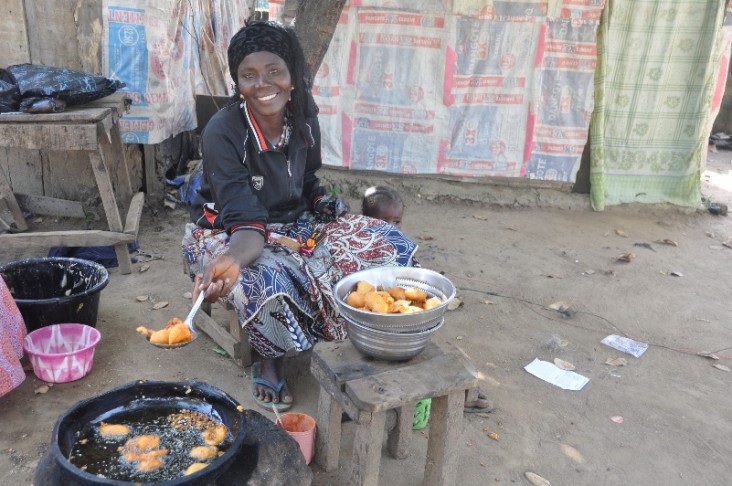
December 2015—It’s bad enough to be an internally displaced person fleeing for your life in Nigeria. But to be a female on the run with seven children between the ages of 1 month and 13 years is unimaginable.
In 2013, Ladi Mathias, then 33, found herself in this position.
Mathias’s husband had to leave her village before their last child was born because Boko Haram was targeting men. “It was so hard given my condition [pregnant] and our other six children, but I knew it was for the best,” said Mathias. Her husband fled to Kuchingoro camp in Abuja to save his life.
A month after the birth of their only daughter, the worst happened—armed insurgents attacked their village of Ngoshe in the Gwoza local governance area of Borno state. Mathias survived the attack and fled to the nearby hills with her children and other villagers. The insurgents followed, so survivors walked for miles to a camp in Cameroon. There, they encountered a cholera outbreak.
“If I did not lose my children to Boko Haram, I was not going to sit around and watch them die from cholera,” said Mathias.
She heard that Adamawa state back in Nigeria was safer, but walking there was not easy.
“My seven children made it almost impossible to make any progress, but a good Samaritan sympathized and paid our transport to Adamawa,” she said.
In June 2014, Mathias and her children finally arrived in Abuja. “Reuniting with my husband was a blessing for my family,” she said. “For a moment, I forgot all my suffering because finally I could face them with my husband.” Although they barely had any food, they were happy to be alive.
Mathias’s experience is similar to many in northern Nigeria, especially in Borno, Yobe and Adamawa states where Boko Haram attacks were prevalent. Internally displaced persons settled in various camps across the country as a result.
USAID’s Maximizing Agricultural Revenue and Key Enterprises (MARKETS II) program, which is designed to improve food security in Nigeria, assessed the displaced persons’ needs and provided training in early 2015 that integrates microenterprise development with nutrition and hygiene. The program is part of Feed the Future, a U.S. Government global hunger and food security initiative.
Microenterprise training has given hope to internally displaced people like Mathias. She learned how to manage a small business, provide affordable, balanced meals for her family, and practice proper hygiene and sanitation to avoid illness.
Before becoming displaced, Mathias was selling akara (soybean cake) and groundnuts in Borno state. The USAID training inspired her to revive her business in the camp. One of the trainers saw her determination and gave her $10 of his own money as startup capital for her now thriving akara business.
Mathias was used to receiving money and food from camp visitors, so she was initially disappointed to hear that the USAID program was providing training. However, she now says that the training was more valuable than previous assistance.
“Before the training, I didn’t know anything about profit or capital. I would just sell and use all the money, sometimes forgetting to keep some for restocking,” she explained. The training gave her the skills needed to keep records and save, which motivated her to open a bank account. Twice a month, she calculates her profits and deposits her savings.
Every two weeks, with profits now of $65 to $75, Mathias saves $50, contributes $5 to her church, and uses the rest for family expenses. Back in Borno, her business produced more akara, but only a quarter of the profit she earns now. Before the training, she could barely afford a single meal for her family, but now her family eats three times a day.
And following instructions on nutrition, Mathias no longer serves carbohydrates only to her family, but also serves locally available vegetables and proteins.
Today, Mathias lives with her husband, daughter and two sons in Durumi camp. She transferred four of her sons to a camp in Edo after learning that it provided a higher quality education.
Mathias wants her husband to earn more income, but there is limited need for his mechanics skills in the camp. She wants to save enough to buy him a small car to start a taxi business.
Asked if she would go back to Borno if the situation stabilizes, she is quick to say no.
“I have realized there are better business opportunities in Abuja, my children will become better people if I do not go back, and I make more money now than when I was in Borno,” she said. She hopes to rent a house and move on with her life outside of the camp.
“I do not have a perfect life, but I certainly have a better one,” said Mathias. “It could have been worse, but this project made it smooth. I will take one step at a time, and I know eventually I will get where I want to be.”
The MARKETS II program, which runs from 2012 to 2017, has trained 5,500 internally displaced persons to date in Kano, Kaduna, Nasarawa, Taraba and Benue states and the Federal Capital Territory.
LINKS
Follow @USAIDNigeria, on Facebook, on Flickr







Comment
Make a general inquiry or suggest an improvement.